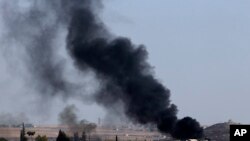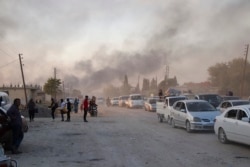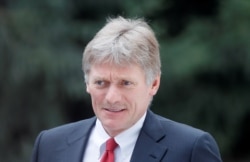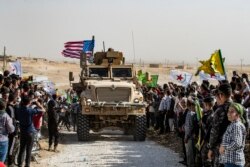Russian leader Vladimir Putin appears to have endorsed Turkey's military incursion into northeast Syria, but is drawing some red lines of his own, including that the offensive doesn't lead to permanent occupation by the Turks of Syrian territory, say analysts.
In return for the Kremlin's acceptance of the Turkish offensive, which Ankara says is aimed at clearing a U.S.-backed Kurdish militia allied with secessionist Turkish Kurds from a large swath of land near the border, there's also the expectation that Turkish President Recep Tayyip Erdogan will acquiesce to Moscow's plans for Syria's future, one that will see President Bashar al-Assad, Russia's ally, reassert control across the whole of Syria.
The Russian and Turkish leaders talked by phone earlier this week as a prelude to Turkish warplanes launching waves of airstrikes on Kurdish positions on the Syrian border towns of Tel Abyad and Ras al-Ayn as well as on Qamishli, the Kurds' de facto capital in northeast Syria. A ground assault also is underway.
The Turkish offensive went ahead after U.S. President Donald Trump announced he would order American troops in the area to step aside, effectively green-lighting the assault, a decision that has prompted a bipartisan rebuke Wednesday from U.S. lawmakers, angry at what they see as an abandonment of the Kurdish Syrian Democratic Forces, America's chief local ally in its war against the the Islamic State group.
The readout of the phone conversation between presidents Putin and Erdogan from officials in Istanbul was short and appears to indicate that Ankara intends, at this stage anyway, to keep to its end of the bargain. Officials said Erdogan told Putin his incursion will "contribute to peace and stability" in the country and open the way for a political process endorsed by Russia to resolve the overall eight-year conflict that's wracked Syria.
Writing Thursday in The Washington Post, a spokesman for the Turkish leader, Fahrettin Altun, reemphasized the message.
"Turkey has no ambition in northeastern Syria except to neutralize a long-standing threat against Turkish citizens," he wrote.
Kremlin's terms
Kremlin spokesman Dmitry Peskov, in turn, reiterated Russia's recognition of "Turkey's right to ensure its security" but he also outlined the Kremlin's conditions for not condemning the offensive, which has been denounced by the government of Syrian President Bashar al-Assad because of worries that Turkey will not leave and because Turkey has invaded without an invitation from Damascus.
Speaking after the start of the Turkish offensive, Peskov said, "It is important to refrain from any actions that may create obstacles on the path of Syrian settlement."
He then added, "We know that certain perspectives are opening up and we understand that it will be a long and thorny path. And now that the Syrian Constitutional Committee has been formed and when the date for its meetings has been appointed, it is vital to refrain from any steps that may harm Syrian settlement."
The idea for the Syrian Constitutional Committee, which is set to meet in Geneva October 30, emerged last year from a Syrian peace conference convened by Russia. The U.N. envoy for Syria was tasked by the conference with forming a committee to draft a new constitution, after many rounds of talks to end the Syria conflict had failed.
Peskov also reiterated Moscow's insistence that "all foreign troops illegally in Syria must leave the country." Moscow is making it clear that Ankara must eventually accept the return of the Syrian army to the border area, say analysts.
Buffer zone
The big question is whether Turkey will do so or whether Erdogan will be tempted to establish a Turkish protectorate along the border and settle more than 2 million Syrian Arab refugees, currently in Turkey, in what would be an ethnically-cleansed buffer zone.
There are concerns in Moscow that Ankara may risk a rupture with Russia and install an occupation regime — that Turkey's cross-border operation could become a longer-term breach of Syrian territorial sovereignty. Russian Foreign Minister Sergey Lavrov has warned publicly the Turkish offensive "could ignite the entire region."
Analysts say the Kremlin is seeking to carefully calibrate its response to the Turks' cross-border incursion, balancing its assiduous efforts to woo Ankara with its determination to shape postwar Syria for its own military and economic benefits.
The Turkish incursion could give Putin a chance to deepen Russian influence in the region, reinforcing its emerging role as the broker among Turkey, Syria and Iran, which has also condemned the Turkish offensive, and Syria's Kurds.
Lavrov underlined the brokership role this week, saying, "We are in touch with both the representatives of the Kurdish side and the representatives of the government, and we are encouraging them to start a dialogue to resolve the problems of this part of Syria, including the problems of ensuring security on the Turkish-Syrian border."
Russia is keen to position itself as a pragmatic and predictable partner, according to Maxim Suchkov, an analyst at the Russian International Affairs Council, a Kremlin-funded think tank in Moscow. Russia has its eye on long-term opportunities following Turkey's operation in northeast Syria, he says. In dealing with a difficult actor like Turkey, Russia has learned "you need to demonstrate empathy on issues that are sensitive and important to Turkish security," he wrote on the Al Monitor news site.
Ongoing issues
After having intervened to save President Assad from being toppled, swinging the war definitively against the rebels seeking to oust him, the Kremlin has become more entrenched in Syria, placing it in a similar position to the U.S. after its interventions in Afghanistan and Iraq. Having intervened, Moscow now partly owns the problem and must find ways to stabilize Syria.
If the Kremlin fails to secure a lasting peace in Syria, or is unable at least to stabilize the war-wracked country, still being buffeted by several micro-conflicts, then entrenchment risks turning into a potentially expensive and embarrassing entanglement that risks undermining Russia's new regional clout, say analysts.
A key challenge is to find an answer to Turkey's Kurdish concerns, preventing any military clash developing between Syria and Turkey and halting the temptation for Ankara to establish a border protectorate, which would infringe Syrian sovereignty and enrage Damascus.
Russia's Foreign Minister Sergey Lavrov met in September with the leadership of the Kurdistan Region of Iraq, seeking help to persuade the Kurdish Syrian Democratic Forces to return the areas currently under their control in northeast Syria to the Assad government in return for semi-autonomy.
"The Turkish incursion in some ways helps Lavrov's endeavor, as long as Moscow can curtail Turkey's brinkmanship," says a Western diplomat based in Moscow. "It presents the Kremlin with the opportunity to use the cross-border offensive as leverage to pressure the Syrian Kurds to fold themselves back into Syria, albeit with self-governing status. The argument being — you don't have U.S. protection, better the Syrians than the Turks," he added.
According to analyst Aron Lund, Russia is balancing contradictory interests in Syria. Earlier this year in a policy paper written for the Swedish Defense Research Agency, Lund noted the Kremlin wants to restore the writ of its client Assad across the country, but at the same time it doesn't want to risk damaging warming ties between Moscow and Ankara.
"Pulling NATO member Turkey out of America's embrace is a goal of major geopolitical significance to Russia," he said.




